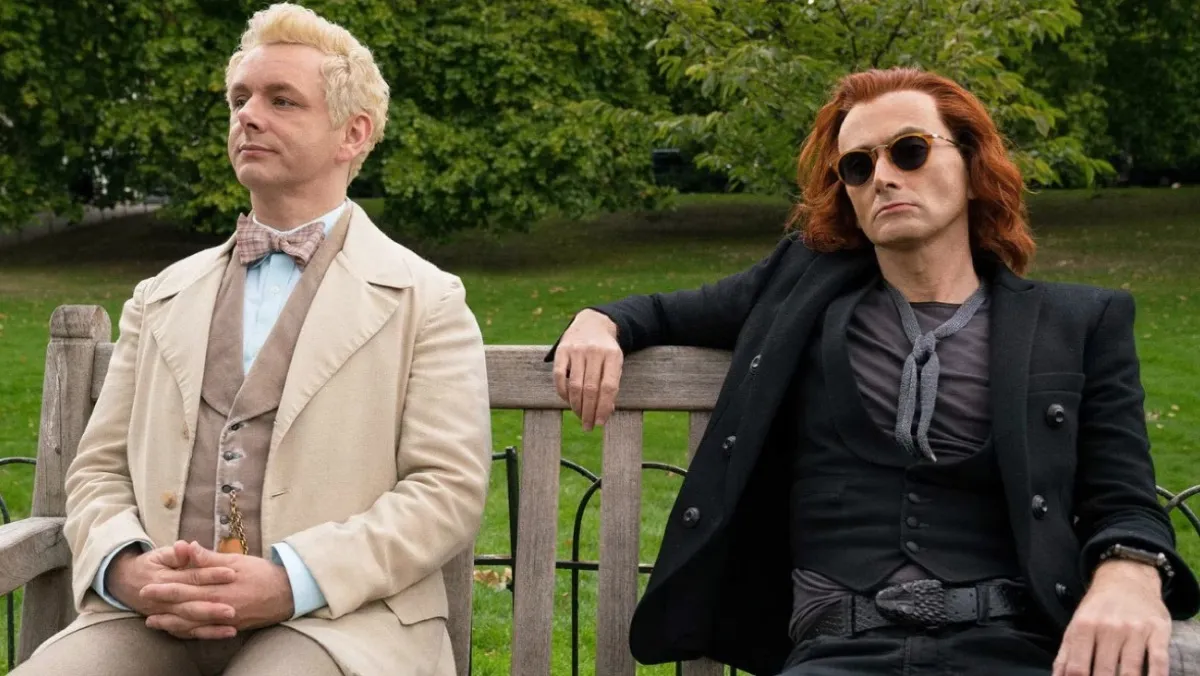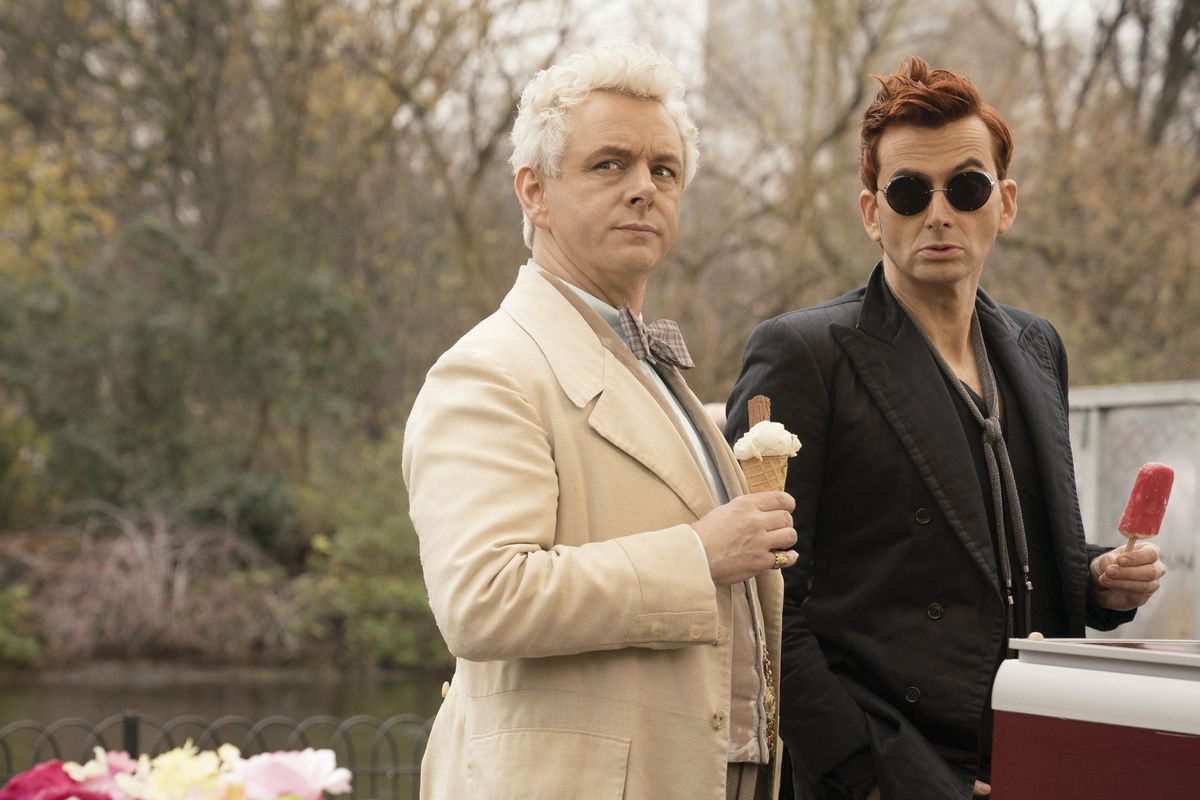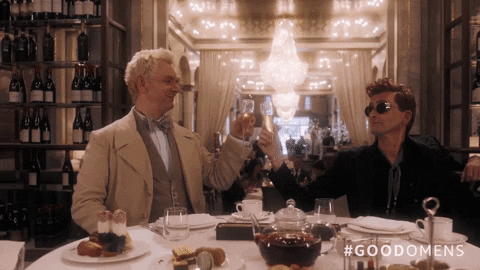**Content Warning: Ableism and trauma, specifically in regards to anti-vaccine ideology.**
If anyone had foretold a year ago, “On May 31 2019 you’ll discover a story that reflects your experiences for the first time,” I would’ve laughed and responded, “That would be wonderful, but I’d say May 31 2039 is more likely.” I didn’t believe it was a possibility because I had never encountered anyone in fiction or real life like me. Because I couldn’t find any resources that applied to my particular experience at all, I had resigned myself to that connection not happening.
But Amazon’s Good Omens TV series came along on that date, and as I watched Aziraphale’s character arc, I saw me. I was speechless—there that story was! For the first time, I’ve found something that reflects my experiences. Good Omens has done so much more than just allow me to see myself in something; it has also given me a way to communicate my experience for the first time. I’ve had to teach myself how to process the trauma I carry with me. I’ve struggled to create language to describe my experience.
Sometimes trauma is so deep that it feels undefinable. Every word I had come up with felt inadequate, so I remained silent. This void of language had been eating away at me, but seeing Aziraphale’s journey has given me language that I didn’t know how to articulate before! I now have something to draw upon to help me answer, “What was it like? How does it feel?” I originally believed that I would have to find the language on my own, but I don’t feel as alone in that journey anymore. I can write this now.
For my entire childhood, I believed that vaccines caused my autism, because my mom and a few other adults taught me to believe it. I didn’t know of any other way to view myself. I was a child who didn’t know how to question authority. “Normal” is the only option in their world. To anti-vaxxers, existence as an autistic person is terrible and unnatural; the goal is to unearth the “normal” person “trapped” underneath.
Not only was everything done to ensure that I didn’t act autistic, but I was also taught to believe that this “normal” me was my true self. No hand flapping, must make eye contact, must know all social rules … I worked to pass as neurotypical because if they believed this is who I really am, then it must be. After I became good at passing, my mom and the others joyously proclaimed that I had “recovered from autism.” My mom said that I wouldn’t be the person I am without them and went so far to say that my “recovery” was a miracle thanks to God.
However, I knew deep inside me, over time, that I wasn’t “normal.” Other non-autistic people easily saw through my attempts to pass and made it clear that I was always “other” to them, no matter what I did. I longed to share with anyone that I’m autistic so that I could drop the mask, but my mom said that I’d lose my friends if I did. So, I stayed in the autism closet because I feared I’d lose everything. If I failed to pass, then what was I?
At 16, I reached a point where my mind broke under the pressure, and I had to seek help. One day, I was sharing, with my therapist, how I’ve hated myself for so long, and she responded, “Have you thought about embracing autism?” I froze in shock; how could such a concept exist? I was terrified, but I decided to look online and see what this was all about.
There, I found autistic people saying that being autistic is beautiful and natural—that autism is an identity inseparable from personhood. My mind was in conflict because it was against everything I had known, but it felt true. For the first time, I saw another way to live. So, I decided to try to see if autism acceptance was right for me and began to question anti-vaccine views.
My mom was angry and attempted to prevent me from going on that journey. She begged me to read the book that her beliefs come from, but as I read it, anti-vaccine ideology didn’t feel right anymore. I realized that living under anti-vaccine rhetoric meant being in pain for the rest of my life. Loving my autistic identity is the future worth fighting for.
After a year of conflict, my mom saw that I remained firm in my new beliefs and decided to stop preventing me from accepting my autistic identity. She hasn’t changed her views, but I’ve been able to forge my own path. I’m more free now than I’ve ever been.
Before I dive into Good Omens itself, for those who aren’t familiar, the series is an adaptation of Terry Pratchett and Neil Gaiman’s 1990 novel of the same name and revolves around Aziraphale and Crowley, an angel and a demon who are trying to prevent Heaven and Hell from bringing about the Apocalypse, because they love each other and the life they have on Earth.
Aziraphale and Crowley have loved each other for 6,000 years, but Aziraphale struggles to choose their love because he is still attached to Heaven’s doctrine on what the universe is and must be. The Apocalypse forces him to confront everything he has been taught to believe and what his truth is. Each Good Omens scene involving Heaven brought me back into that space in my own world.
Anti-vaxxers tend to possess a “We’re The One True Belief” mentality, where one day the world will realize the truth about vaccines and all those people who said otherwise will be proven wrong. Seeing the angels in Good Omens’ Heaven espouse the Great Plan as The One True Plan to believe, using God’s name, was scary because I had this pervasive feeling of familiarity. Every interaction between Aziraphale and the Archangels felt like I was seeing my experiences in a mirror.
Aziraphale perceives the world differently from the other angels from the beginning, so he isn’t the “normal” angel that Heaven expects. Since divergent thought isn’t allowed in Heaven, Aziraphale represses himself because that’s the only option he’s been taught. I noticed the way he held his hands clasped tightly behind his back with tense posture in Heaven and recalled how I’ve policed my body constantly. Most of all, I saw myself in how Aziraphale works to embody the good angel Heaven expects and follow the Great Plan, yet Heaven never stops abusing him for being different.
Heaven’s ideology has been so ingrained in him that he thinks his worth depends on how well he passes as Heaven’s idea of an angel. At the same time, he’s aware that Heaven doesn’t view his attempts as enough, but he keeps trying because the Great Plan must be right. A life under Heaven’s ideals must be the only way to exist. As Aziraphale immerses himself in life on Earth with Crowley, he’s shown that Heaven’s ideology isn’t the only option, but he struggles to believe that a life without Heaven is possible and good.
A life where he can spend the rest of his life with Crowley, a demon who, similar to him, also perceives the world differently from everyone else? A life where he doesn’t need to pass? To him, that can’t be right, since Heaven views that life as inherently unthinkable. Failing Heaven means losing everything that matters, so hiding is necessary.
However, the coming of Armageddon forces him to question whether the Great Plan is right and whether a future where he’d be able to live authentically is something he can fight for. So, he attempts to speak to God as one last chance for everything he believed in to still be worth allegiance to Heaven, but only the Metatron answers his call, and declares the party line all over again.
“The point of the war is to win it” is the breaking point for Aziraphale. Everything he was raised to believe as true is proven toxic. The society that raised him is fallible. Living under Heaven’s rules isn’t life.
He realizes that his love for Crowley and Earth is his truth, and he’ll defy the Great Plan to live that truth freely. When he questions whether the Great Plan is the Ineffable Plan, he finds power in using his divergent thinking to expose Heaven’s flawed logic. Aziraphale is proof that leaving an oppressive ideology behind to live your truth is possible, and you can create your own meaning that sustains you.
I’m just one of many fans who connect deeply with Good Omens because it resonates with our experiences as disabled people in an abled world. We have to fight for the right to create our own future in the face of authority figures who impose their views of our destinies upon us. If our minds are perceived as not “normal,” abled society tries to change us. Of course we’re going to see ourselves in these characters, from Aziraphale to Crowley to Anathema, who perceive the world differently and reject Heaven and Hell’s narrow visions of what the world can look like.
What’s so empowering to me about Good Omens is that Aziraphale and Crowley fight for a world where they are free to be different. The story is very much about how the universe needs divergent thought in order to thrive. I see so much potential in what Good Omens can contribute to challenging the social construct of what “normal” is. You can question what you’ve been taught. You can reject an ideology that thinks your identity is unnatural and choose a new path for your life that brings you happiness. You can be different.
Here’s to the divergent.
(images: Amazon Prime Video)
Eryn Star (they/them) is a disabled queer disability rights activist and student based in the U.S. You can check out their Twitter @NeuroCosmos.
Want more stories like this? Become a subscriber and support the site!
—The Mary Sue has a strict comment policy that forbids, but is not limited to, personal insults toward anyone, hate speech, and trolling.—










